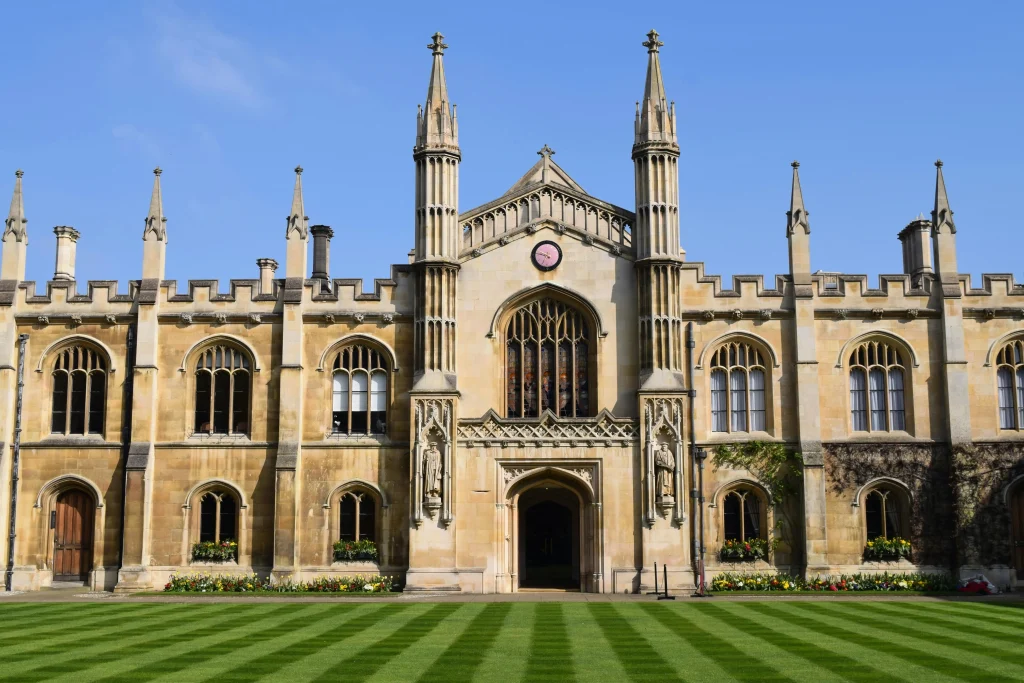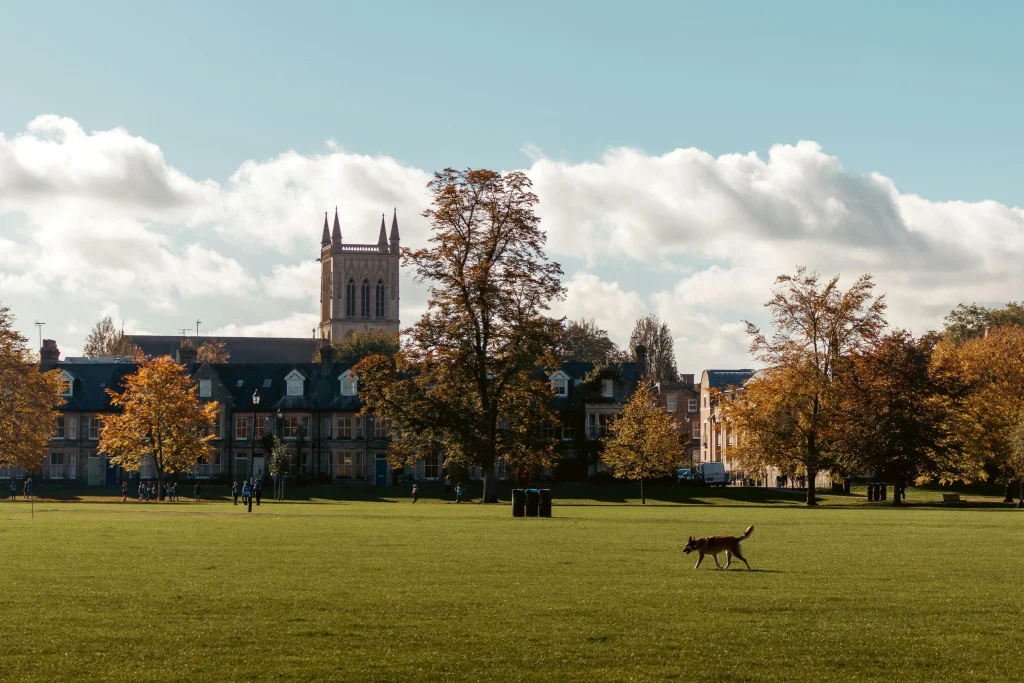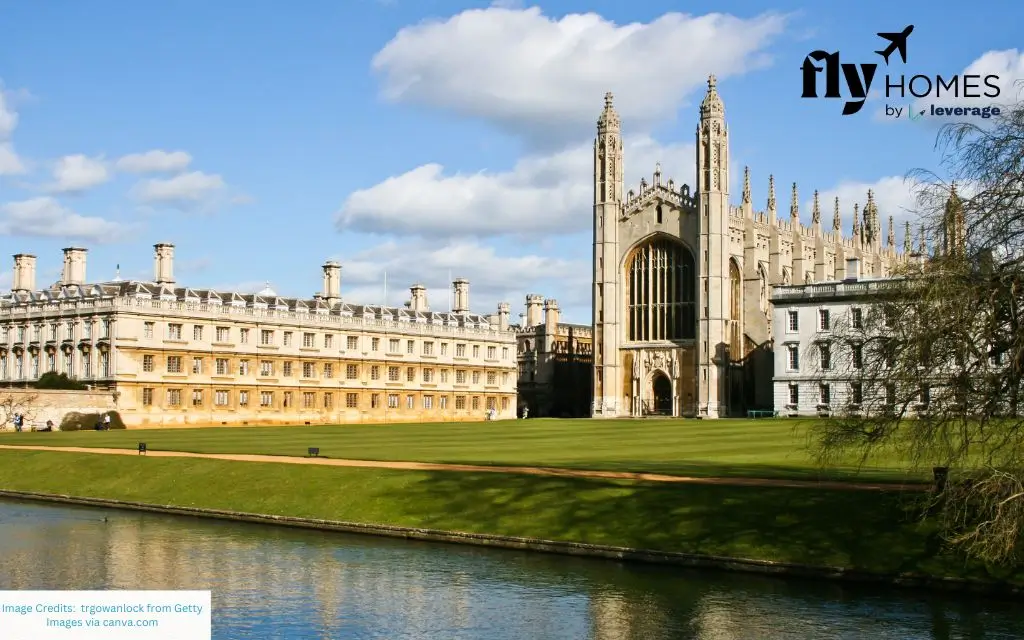How to Get into Cambridge University: Cambridge is an iconic name which is known for its beautiful architecture and world-class education. It’s no wonder so many students dream of studying there. But let’s be honest, getting into Cambridge can feel like a daunting task. It’s competitive, and the application process can seem complicated. Where do you even start?
That’s where this guide comes in. In this article, we’ll break down everything you need to know, from understanding the admissions criteria to crafting a strong application. We’ll cover the essential steps, offer practical tips, and address students’ common questions. This guide is designed to help you understand how to get into Cambridge University. Let’s get started!
Table of contents
- How to Get into Cambridge University as an International Student?
- How to Get Admission to Cambridge University After 12th? (Undergraduate Admissions)
- How to Get into Cambridge University for Masters? (Postgraduate Admissions)
- Cost of Studying at Cambridge University
- Understanding the Cambridge Admissions Process
- Tips for a Strong Application
- What if You Don’t Get Into Cambridge University?
- FAQs on How to get into Cambridge University
How to Get into Cambridge University as an International Student?

How to get into Cambridge University as an international student is a common question among ambitious students worldwide. Studying at Cambridge is a dream come true, offering a world-class education and a rich cultural experience. However, the process can seem challenging. Let’s explore how to get into Cambridge University as an international student and turn your dream into reality.
Specific Requirements for International Students
International students must meet specific requirements to study abroad. In this section, we break down the specific requirements for international students that top universities look for.
- English Language Proficiency: Cambridge wants to know if you can understand and speak English well enough to study there. That’s why you’ll need to take a test, like IELTS or TOEFL. These tests check your reading, writing, listening, and speaking skills.
- Academic Qualifications: Cambridge also needs to make sure your school qualifications are similar to what UK students have. They have information on their website about how your qualifications match up. It’s called “qualification equivalencies.” Look it up! It will tell you if your grades and diplomas are good enough.
- Visa Requirements: If Cambridge says “yes!”, then you need permission from the UK government to live and study there. That means getting a student visa. The UK government website has all the details about visas. It tells you what you need to do, what documents you need, and how to apply. Don’t worry, it’s all online.
Finding Funding and Scholarships for International Students
Studying abroad costs money. That’s the truth. But there’s good news! Cambridge has scholarships and other ways to help international students pay for their studies. They don’t want money to be the reason you can’t come. Here is how you can look for finding scholarships for international students.
- Do your research: Go to the Cambridge website and search for “scholarships” or “funding.” They have pages and pages of information. You can filter by your subject, your country, and what kind of funding you need.
- Don’t be afraid to ask: If you have questions about funding, contact the Cambridge financial aid office. They’re there to help! They can answer your questions and give you advice.
Cultural Considerations and Preparing for Life in the UK
Moving to a new country is a big adventure! It’s exciting, but it can also be a little scary. Things might be different in the UK than what you’re used to. Here are some of the cultural considerations that you should keep in mind while living in the UK.
- Be prepared for cultural differences: The food, the customs, and even the way people talk might be a little different. That’s okay! It’s all part of the experience. Read about British culture before you go. It will help you adjust.
- Cambridge is here to help: Cambridge knows it can be tough to move to a new country. They have lots of resources for international students. Look for student societies which are a great way to meet people and get support. Cambridge also has international student support services.
- Get involved: Join clubs, go to events, and explore the city. It’s the best way to meet people, learn about the culture, and make the UK your new home away from home.
Also Read:
- Cambridge Acceptance Rate in 2025 for International Students
- Exploring the Cambridge Weekend Breaks for Students
How to Get Admission to Cambridge University After 12th? (Undergraduate Admissions)
If you are thinking about studying at Cambridge University after the 12th, that’s awesome! It’s a big dream, and it’s definitely possible with the right approach. This section will discuss each step about how to get into Cambridge for your undergraduate degree.
Choosing the Right Course and College
Cambridge is a bit different from other universities. Think of them as smaller communities within the bigger university. Each college is unique. And they all teach the same courses! So, how do you choose?
First, decide what you want to study. What subject are you passionate about? Cambridge has lots of courses. Once you know your subject, you can start looking at colleges. Some colleges are known for certain subjects. For example, one college might be really strong in engineering, while another is known for its history department. It’s worth checking this out.
Go to the Cambridge website. They have information about all the colleges. Read about them. Look at the pictures. See what feels like a good fit. Don’t worry too much about picking the perfect college. Most students are happy with whichever college they get into.
Crafting a Compelling UCAS Application
The UCAS application is how you apply to most universities in the UK, including Cambridge. It’s your first chance to impress them, so make it good! Here is what you need to craft a compelling UCAS application.
- Personal Statement: This is so important. It’s your chance to tell Cambridge who you are. Why do you love your subject? Don’t just list your grades. Share experiences and show them your passion. Be yourself! Don’t try to be someone you’re not. Cambridge wants to see the real you. This is where you really shine.
- Academic Transcripts: These are your official school records. They show your grades. Make sure they’re accurate. If your transcripts aren’t in English, you’ll need to get them translated.
- Academic Grades: These are the academic grades that you score in your final exams. Cambridge looks at these and wants to see that you’re doing well in your studies.
- Letter of Recommendation: These are letters from your teachers. They should talk about your strengths and why you’d be a good student at Cambridge. Ask teachers who know you well. Give them plenty of time to write the letters. Tell them about your achievements and your goals.
Preparing for the Cambridge Specific Application (SAQ)
Cambridge also has its own application, called the SAQ. This is in addition to the UCAS application. The SAQ asks specific questions. They want to know why you want to study at Cambridge specifically. Don’t just repeat what you said in your UCAS application. Use the SAQ to go deeper which reflects your research.
Acing the Cambridge Interview
If Cambridge likes your application, they might invite you for an interview. This can be nerve-wracking, but it’s also a good sign! Preparing for the Cambridge interview takes proper preparation. Here are some of the tips on how you can ace the interview for Cambridge University.
- Practice, Practice, Practice: Think about the potential questions like “Why this subject?” “Why Cambridge?” “What are your interests?” Practice answering these questions out loud. You can even practice with a friend or teacher.
- Be Yourself: Don’t try to be someone you’re not. Be genuine. Let your passion show. They want to see the real you.
- Ask Questions: Asking questions shows you’re engaged. It shows you’re curious. Prepare some questions beforehand. It shows you’ve thought about the course and the college.
How to Get into Cambridge University for Masters? (Postgraduate Admissions)

So, you’re thinking about a Master’s degree at Cambridge? That’s amazing! A postgraduate degree from Cambridge can open up incredible opportunities. But where do you even begin? It can seem like a maze, right? Don’t worry, we’ll break it down step by step. This section is your guide to navigating the Cambridge Master’s application process.
Researching Postgraduate Courses
Firstly, research and find the right program. Cambridge offers a wide range of Master’s courses. Think carefully about what you want to study. What are you passionate about? What do you want to specialize in? Here is how you can choose the right program for you.
- Explore the Cambridge website: The website is your best friend here. Look at the departments and faculties. Read about the different Master’s programs they offer. Pay attention to the course descriptions, the curriculum, and the research areas.
- Find your supervisor: Your supervisor will guide you through your Master’s degree. They’ll support your research. See who is doing research in your area of interest. Don’t be afraid to contact potential supervisors. Introduce yourself and your research interests. A good supervisor can make a huge difference in your experience.
- Think about your research: A strong research proposal is often key for Master’s applications. Start thinking about your research question early. What do you want to investigate? Why is it important? What methods will you use?
Also Read:
- 5 Relaxing Things To Do Near Cambridge: Soothe Your SOUL
- Downing College Accommodation Cambridge: List, Features, Benefits
Application Requirements for Postgraduate Studies
Okay, now you’ve found a program and a potential supervisor. Let’s talk about what you need for your application. Below are the things that you need to pursue your postgraduate programmes.
- Academic Transcripts: Cambridge will want to see your academic record. Make sure your transcripts are official and translated into English if necessary. Good grades are important, but they also want to see consistent academic performance.
- Research Proposal: This is your chance to shine. Your research proposal should be clear, concise, and compelling. Explain your research question, your methodology, and why it matters. This is often the most important part of your application.
- Letters of Recommendation: Ask professors or other professionals who know your work well to write letters of recommendation for you. Choose people who can speak to your research skills and your potential.
- English Language Proficiency: If English isn’t your first language, you’ll need to prove your English language skills. Take a test like IELTS or TOEFL. Check the Cambridge website for the required scores.
Scholarships for Postgraduate Students
Master’s degrees can be expensive. But don’t worry, there are funding options available. Below are the scholarships and funding options that are available for postgraduate students.
- Explore scholarships and grants: Cambridge offers a range of scholarships and grants for postgraduate students. Check their website carefully. See what you’re eligible for. Many scholarships are competitive, so apply early!
- Look for external funding: There are also external organizations that offer funding for postgraduate studies. Do some research and see what’s out there.
- Consider loans: Student loans can be another option for financing your studies
Cost of Studying at Cambridge University

If you are considering studying at Cambridge University, you might be wondering about the tuition fees. Cambridge is one of the top universities in the world, but its fees can be high, especially for international students. The cost depends on the program you choose.
Below is a breakdown of the average tuition fees for different programs.
| Program | Tuition Fees for UK Students (Per Year) | Tuition Fees for International Students (Per Year) |
| Undergraduate (Arts & Humanities) | GBP 9,250 | GBP 24,507 – GBP 30,500 |
| Undergraduate (Science & Engineering) | GBP 9,250 | GBP 33,825 – GBP 63,990 |
| MBA (Business School) | N/A | GBP 64,000 |
| Master’s in Science & Engineering | GBP 13,000 – GBP 15,000 | GBP 31,000 – GBP 63,000 |
| Master’s in Arts & Humanities | GBP 11,000 – GBP 14,000 | GBP 26,000 – GBP 40,000 |
| Medicine (Clinical Years) | GBP 9,250 | GBP 67,194 |
Understanding the Cambridge Admissions Process
Getting into Cambridge University is a dream for many students. However, the admissions process can be challenging and highly competitive. Cambridge looks for students with strong academic records, critical thinking skills, and passion for their subject.
To apply, you need to meet eligibility criteria, submit required documents, and go through interviews and assessments. Understanding each step of the process will help you prepare better and increase your chances of getting accepted. Let’s break it down in detail.
What Cambridge Looks For in Applicants?
Cambridge isn’t just looking for the smartest kids in the class. They want well-rounded individuals who are truly passionate about their chosen subject. Here’s what they’re looking for:
- Academically Excellent: Cambridge puts emphasis on good grades They want to see that you can handle the academic rigour of Cambridge. They’ll look at your past academic performance.
- Passionate About Their Subject: This is huge. Cambridge wants students who are genuinely excited about what they want to study. Why does this subject fascinate you? What have you done outside of class to learn more about it? Show them your enthusiasm!
- Strong Personal Statement: This is your chance to tell your story. What makes you unique? What experiences have shaped your interest in your field? Be honest, be yourself, and let your personality shine through.
- Demonstrated Skills and Experiences: Have you done any research? Any internships? Volunteering related to your subject? These experiences show your commitment and give you valuable insights. They make your application stand out.
Key Stages of the Application Process
Applying to Cambridge involves several steps. Here’s a simplified breakdown of the key stages that are required for the application process at Cambridge University:
- UCAS Application: This is the main application for all UK universities. You’ll fill in your personal information, your academic history, and your course choices.
- Supplementary Application Questionnaire (SAQ): Cambridge has its own extra questionnaire. This is where you can tell them more about yourself and your academic interests. It’s your chance to go deeper than the UCAS application.
- Interviews: If Cambridge likes your application, they’ll invite you for an interview. Don’t be nervous! It’s a chance for them to get to know you better and assess your academic potential.
- Written Assessments (for some courses): Some courses might require a written test. This is to evaluate your skills and knowledge in your chosen subject.
Admissions Timeline and Deadlines
Cambridge has strict deadlines. You must be organized. The UCAS deadline for Cambridge is usually earlier than for other universities, often in October. Don’t miss it! Check the official Cambridge website for the exact deadlines for your course. Write them down and set reminders for the same. Don’t leave it to the last minute!
Tips for a Strong Application
A strong application is important to get into Cambridge University as it increases your chances for successful admission. This section is packed with tips to help your application shine. These apply whether you’re going for an undergraduate or a postgraduate degree. Here are five key tips to make your application stand out:
- Start Early and Be Organized: The Cambridge application process is detailed and the deadlines are early. Don’t wait until the last minute! Start your research early. Make a timeline and keep track of deadlines. Staying organized will reduce stress and help you submit your best work.
- Focus on Your Personal Statement/Research Proposal: They’re your chance to show Cambridge who you are. Why are you the perfect fit for their program? For undergraduates, it’s a personal statement. For postgraduates, it’s often the research proposal. Invest serious time and effort in these. Be genuine and specific. Don’t just list your achievements; explain what you learned from them.
- Practice for Interviews: Interviews are a big part of the Cambridge process. They can seem scary, but they’re also a chance for you to shine. Practice answering common interview questions. Think about what you want to say. Practice with a friend, a teacher, or even in front of a mirror. The more you practice, the more confident you’ll feel.
- Seek Guidance from Teachers and Advisors: Don’t be afraid to ask for help! Your teachers, professors, and academic advisors are valuable resources. Ask them for feedback on your personal statement or research proposal. Ask them for advice on the application process. They’re there to support you.
- Show Your Passion: Cambridge wants students who are genuinely interested in their subject. Let your passion shine through in your application. Why do you love this field? What makes you excited to learn more? Show them your enthusiasm and let your genuine curiosity be evident in every part of your application.
What if You Don’t Get Into Cambridge University?
Okay, let’s talk about something that’s tough to think about, but it’s important to address: what if you don’t get into Cambridge? It’s okay to feel disappointed. It’s a competitive process, and not everyone gets in. But it’s not the end of the world. Seriously. There are still so many amazing opportunities out there. Here’s what you can do:
- Explore Alternative Universities: There are tons of other excellent universities in the UK and across the globe. Do some research. Look at other programs that interest you. You might find a perfect fit somewhere else. Don’t limit yourself to just one option.
- Reapplying in the Future: Didn’t get in this time? You can always try again! Many students reapply and are successful the second time around. Use this experience to your advantage.
- Gaining Relevant Experience: If you’re thinking about reapplying, focus on gaining more experience in your field. Do some research and internships. These experiences will make your application stronger next time. They also show your commitment to your chosen field.
- Consider Other Postgraduate Options (if applicable): Look at other universities that offer similar programs. You can always apply to Cambridge later, after gaining more experience or completing a Master’s elsewhere.
- Don’t Give Up on Your Dreams: This is the most important point. A rejection from Cambridge doesn’t mean you’re not talented or capable. It just means it wasn’t the right fit this time. Keep working hard and pursuing your passions. Your dreams are still valid. Don’t let one setback discourage you.
Getting into Cambridge is a challenging but rewarding journey. It requires dedication, hard work, and a genuine passion for your subject. Don’t be discouraged by the competition. Focus on highlighting your strengths, showcasing your unique qualities, and demonstrating your commitment to your academic pursuits. Good luck!
Hope you liked reading our blog about How to get into Cambridge University. For a stress-free stay during your study abroad adventure, choose Fly Homes. Call 1800572118 to reserve your ideal accommodation abroad with ease.
FAQs on How to get into Cambridge University
To get into Cambridge University, you need excellent grades, strong test scores, and a compelling application. You must also submit the required documents, a personal statement, and letters of recommendation. Some courses require entrance tests and interviews.
Cambridge looks for A-levels (A*AA), IB (40+ points), or equivalent high scores in your country’s exams. Each course has specific subject requirements, so check them before applying.
Yes, Cambridge has a low acceptance rate of around 18%. It is highly competitive, and only the best applicants with strong academics, test scores, and interviews get in.
You need to apply through UCAS, submit a personal statement, and provide academic transcripts and references. Some courses require an entrance test and an interview before the final decision.
Many courses require entrance tests like the TMUA, BMAT, ENGAA, and ELAT. Check your course page to see if a test is needed.
The interview is a key part of the selection process. Professors assess your critical thinking, problem-solving, and subject knowledge. Be prepared to discuss your academic interests.
Yes, Cambridge offers scholarships like Gates Cambridge, Cambridge Trust, and college-specific awards. Scholarships are based on academic excellence and financial need.
Cambridge prefers traditional subjects like Maths, Physics, Chemistry, Biology, History, and Literature. Avoid soft subjects like General Studies.
For courses like Medicine and Law, work experience is recommended. For other subjects, it’s not required but can strengthen your application.
No, you can only apply to one of them in the same academic year unless you’re applying for a second undergraduate degree or certain exceptions like organ scholarships.
Follow Us on Social Media




























